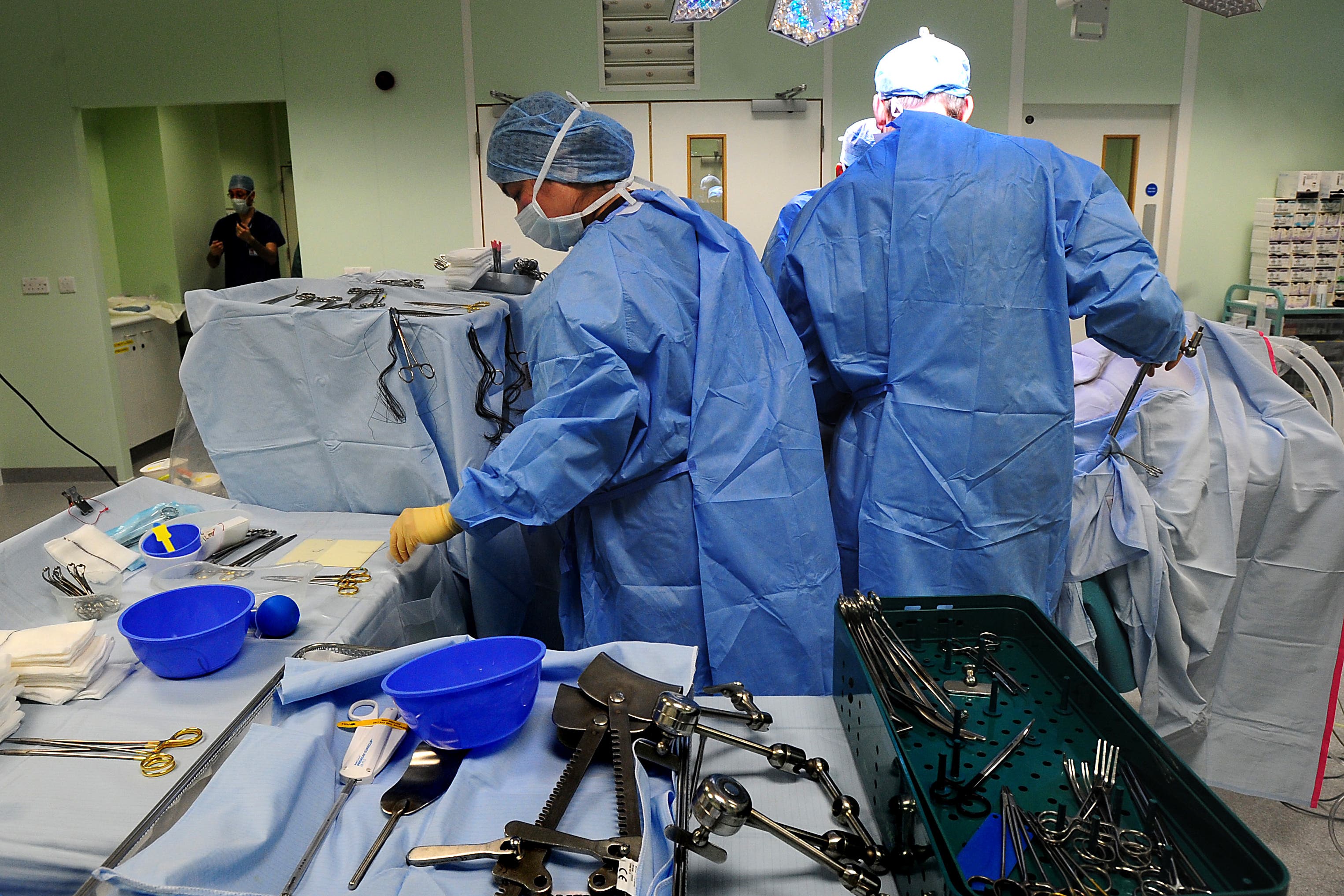Record number of ‘foreign objects’ being left inside patients
Leaving a surgical tool or medical equipment inside a patient after an operation or procedure is classed as a ‘never event’ by the NHS.

Hospitals have logged a record number of “episodes” of people needing help after a surgical tool has been left inside them following an operation or procedure, according to new data analysis.
Blunders involving a “foreign object accidentally left in body during surgical and medical care” led to a record 291 “finished consultant episodes” in 2021/22.
This could include swabs, gauze or even surgical devices, including drill bits.
Two decades earlier, in 2001/02, there were 156 of these episodes.
The PA news agency examined more than 20 years of hospital data for England.
The lowest number was in 2003/04, when 138 episodes were recorded by clinicians.
Last year, the average age of patients with a foreign body left inside them was 57.
But the figures show a broad age range affected by the errors, from babies to patients over the age of 90.
It comes as the NHS is under intense pressure and is caring for more patients than ever before.
Indeed hospital data shows there were more than 1.7 million “finished consultant episodes” (FCEs) attributed to “external causes” in 2021/22 compared with 840,000 two decades earlier.
The so-called “external causes” data shows some of the reasons people need hospital care and also includes information on the number of patients treated for car crash injuries, falls and dog bites.
Overall, there were 19.6 million FCEs recorded in 2021/22 – an increase of 21.4% compared to the year before.
Swabs and gauzes used during surgery or a procedure are one of the most common items left inside a patient, but in rare cases surgical tools such as scalpels and drill bits have been found.
There are strict procedures in hospitals to prevent such blunders, including checklists and the repeated counting of surgical tools.
Leaving an object inside a patient after surgery is classed as a “never event” by the NHS – meaning the incident is so serious it should never have happened.
When a surgical implement is left inside a patient, it can require further surgery to remove it.
Sometimes such errors are not discovered for weeks, months or years after the event.
While we fully appreciate the crisis facing the NHS, never events simply should not occur if the preventative measures are implemented
The NHS Digital data does not make clear when the patient had their initial surgery or treatment, or whether it was performed under the NHS or by a private hospital.
And each “episode” may not be the equivalent of one patient as some people may have sought care more than once at a different hospital.
Commenting on the analysis, Rachel Power, chief executive of the Patients Association, said: “Never events are called that because they are serious incidents that are entirely preventable because the hospital or clinic has systems in place to prevent them happening.
“When they occur, the serious physical and psychological effects they cause can stay with a patient for the rest of their lives, and that should never happen to anyone who seeks treatment from the NHS.
“While we fully appreciate the crisis facing the NHS, never events simply should not occur if the preventative measures are implemented.”
A woman from east London described how she “lost hope” after part of a surgical blade was left inside her following an operation to remove her ovaries in 2016.
The 49-year-old, who spoke to PA on condition of anonymity, said: “When I woke up, I felt something in my belly.
“The knife they used to cut me broke and they left part in my belly.”
She added: “I was weak, I lost so much blood, I was in pain, all I could do was cry.”
The object was left inside her for five days, leading to an additional two-week hospital stay.
“I lost hope, I lost faith in them, I don’t trust them anymore,” she said.
The wound from the second operation also took a long time to heal – leaving a scar.
“Every time I look at my belly it’s there,” she added.
Emmalene Bushnell and Kriya Hurley, from the medical negligence department at the law firm Leigh Day, which represented the woman in her subsequent claim, said in a joint statement: “Undergoing surgery is obviously very worrying for any patient but in cases of retained foreign objects they often lead to significant harm to the patient.
“Unfortunately, we continue to see cases of retained objects post-surgery resulting in patients being readmitted to hospital, having a second surgery, suffering sepsis or infection, experiencing a fistula or bowel obstruction, visceral perforation, and psychological harm.
“These events, known as never events, should not occur and we welcome any steps to reduce the incidence of retained objects.”
Earlier analysis by PA, published in May 2022, found that some 407 never events were recorded in the NHS in England from April 2021 until March 2022.
Vaginal swabs were left in patients 32 times and surgical swabs were left 21 times.
Some of the other objects left inside patients included part of a pair of wire cutters, part of a scalpel blade, and the bolt from surgical forceps.
On three separate occasions over the year, part of a drill bit was left inside a patient.
An NHS spokesman said: “Thanks to the hard work of NHS staff, incidents like these are rare.
“However, when they do happen the NHS is committed to learning from them to improve care for future patients.
“Last year, the NHS published new guidance introducing a significant shift in the way the NHS responds to patient safety incidents, which will help organisations increase their focus on understanding how incidents happen and taking steps to make improvements.”
Bookmark popover
Removed from bookmarks